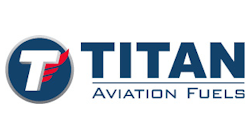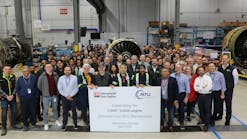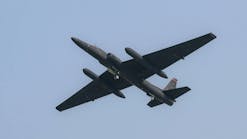Shell Aviation’s High Performance Capability (HPC) turbine engine oil — AeroShell Ascender — has reached yet another milestone in the aviation industry with successful commercial flight operations with the main Brazilian airliner, TAM Airlines. The inaugural flight took off on December 2, 2010, and AeroShell Ascender has since been used in two of TAM’s Airbus A319 International Aero Engines (IAE) V2500 engines in the engine position #2 (right wing).
With over ten years of research and development, AeroShell Ascender is the most rigorously tested AeroShell lubricant in Shell’s history and is setting new performance benchmarks for turbine engine oils. AeroShell Ascender gained approval to the new civil specification SAE AS5780A for Aero and Aero-derived Gas Turbine Engines Lubricants in 2007. In late 2009, following extensive endurance tests mandated by the FAA (Federal Aviation Administration), AeroShell Ascender was cleared for use in IAE V2500 engines.
“With the unprecedented degree of testing by Shell Aviation, we were confident that AeroShell Ascender would match the exacting requirements of today’s turbine engines,” said Lidia Negris, Account Manager, Shell Brazil. “So it was an opportune time to offer the first commercial flight of AeroShell Ascender to TAM, which has a very professional engineering team and has been a customer of Shell Aviation for many years now.”
According to Paulo Meneghel, TAM’s Powerplant Engineering Manager: “TAM has flown with standard grade turbine oil since the 1970s and recognised the need for improved performance. But with the problems some airlines have faced in recent years during the change over process, from standard grade oils to high thermal stability grades oils, combined with our concern over leakages identified from seals, we were interested to learn about this new solution proposed by Shell and arranged for two of our aircraft to fly this new generation lubricant.”
AeroShell Ascender’s technologically advanced formulation was developed to address increasing demands on turbine engines resulting from higher operating temperatures and extended operating time periods between overhauls. It delivers critical performance benefits such as low coking propensity, high resistance to oxidation and thermal degradation, and excellent elastomer compatibility. These could in turn help to extend component life, and cut maintenance and operational costs for the airline.
“Following more than six months of flight using AeroShell Ascender, we are satisfied in its compatibility with most elastomer materials, and that it has presented no leakage or performance degradation from the engines. The change over process has also been smooth thus far,” said Meneghel. “The next target for us is in our CFM56 engines, as soon as approval is obtained from the engine manufacturer for flight evaluation, which we anticipate will happen this year.”
Sjoerd Post, Vice President, Shell Aviation, said: “Clocking in six months of commercial flight time for AeroShell Ascender is a landmark success for Shell Aviation. It’s also only the beginning for AeroShell Ascender, which we strongly believe will take turbine engine performance to new heights. Shell is committed to provide the best products and services for the aviation industry, and AeroShell Ascender is an essential part of our strategy to deliver customer benefits through better technology and innovative products.”





